Best Solar Battery Australia 2025
Isolux solar provide best solar battery Australia for both grid connected and off grid solar system. Our high-performance home solar batteries help you maximize solar energy usage, reduce reliance on the grid, and lower electricity costs. Whether you need a solar battery system for residential or commercial use, our expert team ensures seamless planning, installation, and maintenance to meet your energy needs. Choose Isolux Solar for the best batteries for solar power storage in Australia 2025 and take control of your energy future.
Sungrow Solar Battery
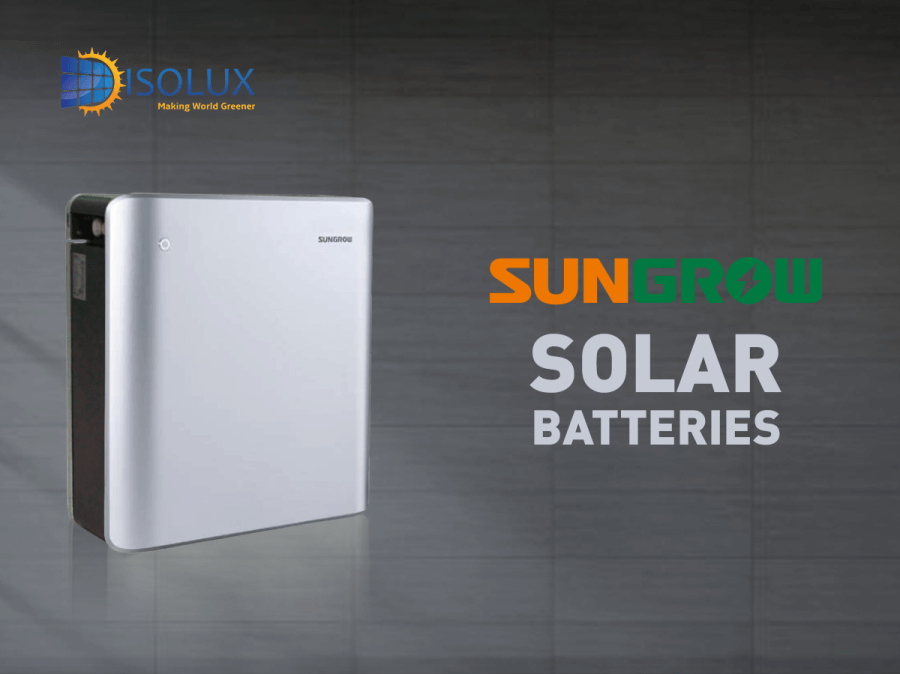
Innovative and Reliable
1. High reliability and safety with prismatic cells from Samsung
2. Cutting-edge bidirectional active cell balancing to prolong the battery lifetime effectively
3. Robust BMS provides multi-protection at both cell level and system level
4. Over 95% depth of discharge to maximise the usable capacity
Easy Installation
1. Suitable for both free-standing and wall-mountable installation
2. Simple setup for multiple batteries
3. One-click online firmware update
Intelligent Management
1. Remote monitoring of battery status with App and web portal
2. Smart hibernation technology to maintain a state of health
Download Datasheet:
Sonnen Solar Battery
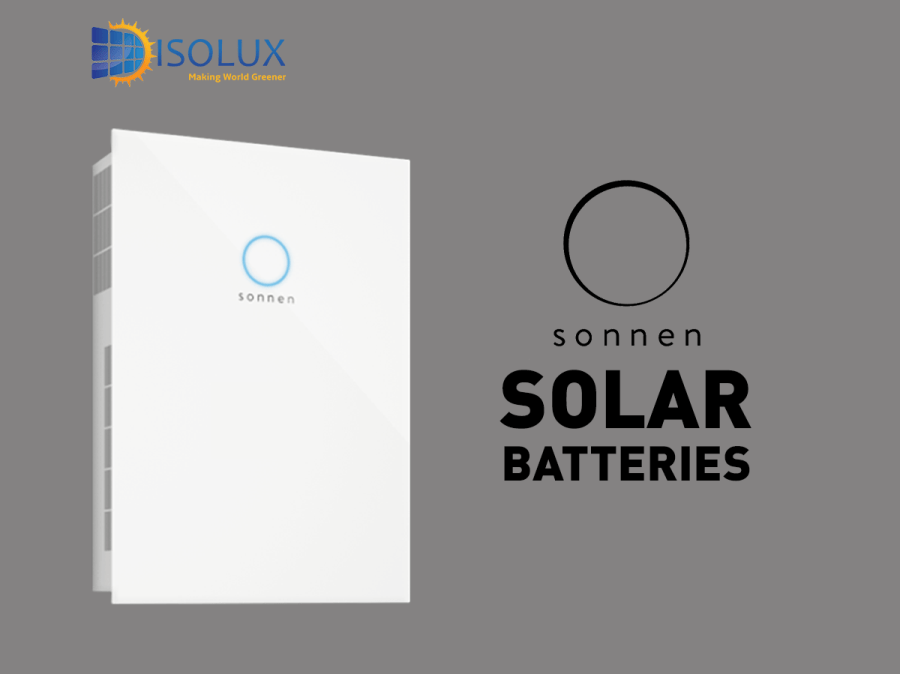
High-quality Components
The sonnenBatterie is a complete system – ready for connection. This means that inside of every sonnenBatterie you’ll find not only the extremely durable battery modules but also an inverter, an intelligent energy manager, measurement technology and the software to operate it all smoothly.
Create Your Own Energy Mix
The sonnenBatterie isn’t limited to storing energy generated by a PV system. A micro-cogeneration plant generates energy and heat. Just connect it to the sonnenBatterie to store its energy when the sun isn’t shining. Since you are generating heat too you’ll be even more independent.
Right Size Energy Storage
Every household has its own energy requirements. That’s why the sonnenBatterie was developed as a multi-stage storage system that can be adapted to most energy needs. With storage sizes ranging from 2kWh to 16kWh, the sonnenBatterie will power a detached house or a multi-family house.
Download Datasheet:
Warranty:
Alpha ESS Solar Battery
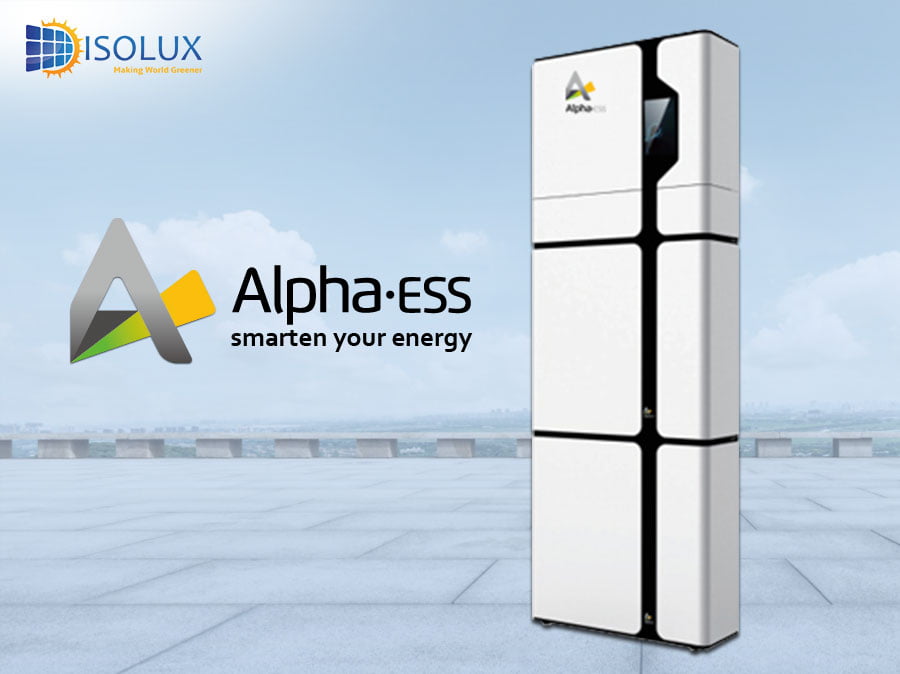
Alpha ESS was founded in 2012 to manufacture energy storage systems for residential and commercial solar systems. ESS stands for Energy Storage System. Alpha ESS is a Chinese company they have offices in Australia, United Kingdom, Italy and Germany. Alpha ESS build the SMILE series for the residential market and the STORION series for the commercial market with a capacity of up to 100kW.
Download Datasheet:
Warranty:
Senec Battery
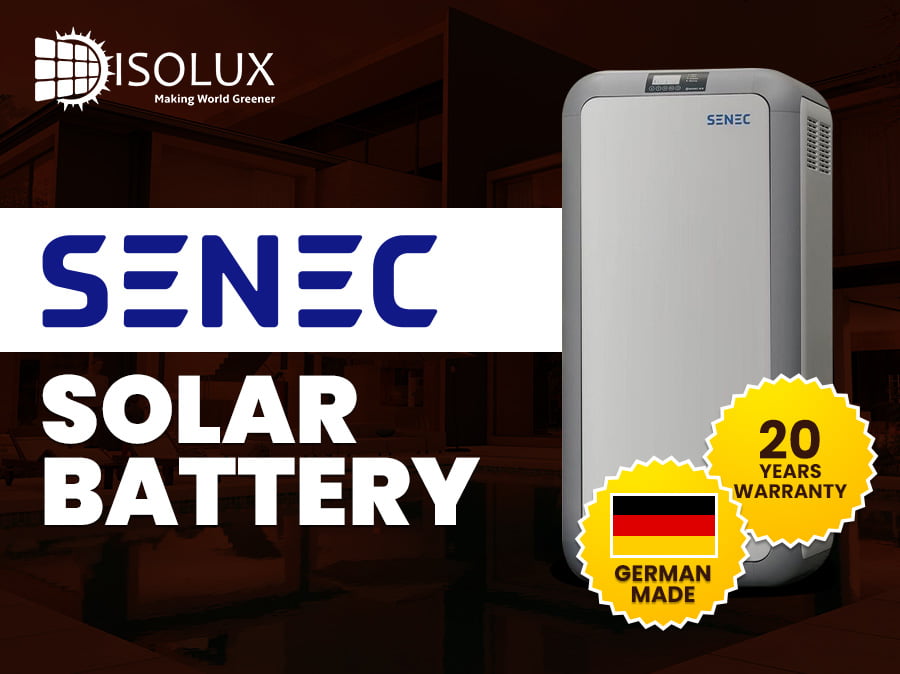
In 2009, Senec was founded in Germany with a primary focus on battery energy storage. Over the years, they have expanded their development efforts to encompass PV solar systems, wind power, and commercial systems.
A distinctive feature of a SENEC battery is its multi-award-winning technology, enabling the battery to undergo two cycles a day. Moreover, it is engineered to withstand 12,000 recharging cycles, which is twice the capacity of its leading competitors. This remarkable capability proves to be particularly advantageous during periods of high energy consumption, making it one of the top solar batteries available in Australia.
Download Datasheet:
Neovolt Solar Battery
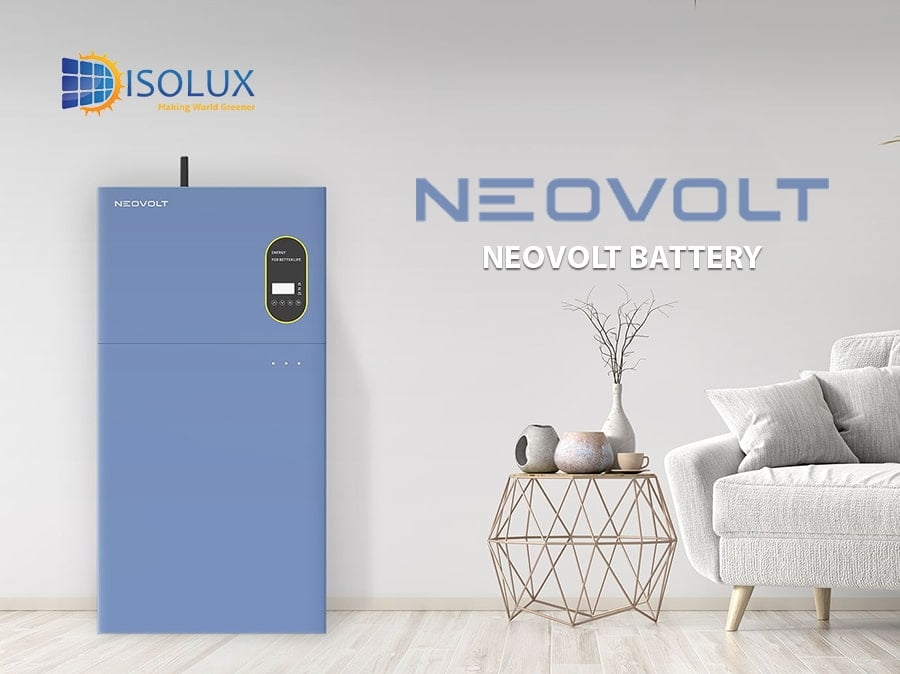
Neovolt is a brand of Suzhou Bytewatt Technology Co., Ltd, a company specializing in the development and production of energy storage solutions. Bytewatt offers a range of products including residential and commercial hybrid inverters, battery inverters, on-grid and off-grid inverters, energy storage batteries, and accessories. Neovolt series is particularly focused on energy storage systems.
Neovolt’s energy storage systems use LFP (Lithium Iron Phosphate) technology, known for its safety, longevity, and efficiency. The systems are designed to optimize the use of solar energy, providing efficient energy storage and reliable power supply. Key features include high battery efficiency (97.3%), robust grid adaptability, and advanced battery management systems that ensure long battery life and safety.
Download Datasheet:
Isolux is a reliable and trusted provider for all your solar battery storage system needs in Australia. If you are looking out for the best batteries for solar power storage, our experts are here to assist you.
What is a Solar Battery?
A solar battery is a battery that stores solar power (electricity) generated by the solar photovoltaic system for later use. This energy stored can be used to power homes and keep the appliances running in the event of power outages, blackouts, rainy days, etc. Solar energy storage batteries are a great investment for homes and commercial premises where grid electricity is unreliable. Solar system batteries are a key part of the solar systems. Choosing the right solar battery is equally important as selecting the perfect solar system.
The NSW Government has launched Solar Battery Incentives for homeowners and businesses to maximize solar energy usage. Get in touch with us to know about the incentive.
How Do Home Solar Batteries Work?
Home solar battery storage system store excess energy generated by your solar panels during the day and make it available for use when needed. These batteries for residential solar systems allow homeowners to maximize energy independence, reduce electricity bills, and ensure backup power during outages.
Step-by-Step Process of How Batteries for Residential Solar Systems Work:
- Energy Generation: Solar panels absorb sunlight and convert it into electricity using photovoltaic (PV) cells.
- Energy Usage & Storage: The generated electricity is used to power household appliances. Any surplus energy is stored in the home solar battery instead of being sent to the grid.
- Discharging Stored Energy: When sunlight is unavailable (at night or on cloudy days), the battery discharges stored electricity to power your home.
- Grid Interaction (Optional): If the battery runs out of stored energy, electricity is drawn from the grid. Conversely, if your battery is full and your system allows, excess power can be sent back to the grid for credits.
How Long do Solar Batteries Last?
The lifespan of a solar battery is determined by three factors: the size of the battery, the amount of power used, and the speed with which the battery can be recharged.
Under typical conditions and if not subjected to high temperatures, most solar battery storage systems are capable of lasting for 10 years or more. That is, they should be able to survive as long as their warranty term, which is typically 10 years for most models.
However, there is insufficient market data to determine if modern solar batteries routinely survive that long in real-world residential installations. Newer generations of solar energy storage batteries have only been available for a few years.
According to user evaluations on several websites, it appears that most homes with storage batteries are satisfied with them thus far, particularly with the top brands. Some customers report issues with battery failure or customer service from the provider, but the batteries appear to be operating as intended in the majority of instances.
Solar Battery Storage System Cost Australia
The solar battery prices in Sydney, Australia, varied depending on various factors such as the size and type of the battery, brand, and retailer. However, the solar battery costs in Sydney could range from $5000 to $15000, including installation.
Power Your Home with a Reliable Solar Battery!
Get your solar battery today and reduce your electricity bills! Contact us now for expert advice and a free quote.
What Size Battery Do You Need?
Choosing the right size for your solar battery storage system depends on two key factors:
- Your Nighttime Energy Consumption – Determine how many kilowatt-hours (kWh) of electricity you use at night and how much of that you want to be supplied by the battery.
- Your Solar System Size – Ensure that your solar panel system is large enough to:
- Generate enough electricity to power your home during the day.
- Produce surplus energy to charge the battery for nighttime use.
How to Estimate Solar Battery Size
To estimate the average daily kWh output of a solar system in Australia, you can use the CEC (Clean Energy Council) guideline, which suggests multiplying the system size (in kW) by 3.9.
For example, a 5kW solar system will generate:
5 × 3.9 = 19.5kWh per day on average.
- If a household consumes 15kWh of electricity daily, the remaining 4.5kWh can be used to charge the solar battery.
- If you need more backup power, you may require a larger solar system and battery capacity.
At Isolux Solar, we consider all these factors to design the ideal solar battery storage solution tailored to your energy needs.
Types of Solar Battery Storage System
1. Lithium-ion (Li-ion)
Lithium-ion (Li-Ion) batteries have grown in popularity among owners of solar energy systems in recent years. Lithium-ion batteries are the newest energy storage technology. As electric vehicle popularity grew, EV makers recognized lithium ion’s potential as a power storage option. They immediately rose to prominence as one of the most extensively used solar system batteries. Lithium-ion chemistry is classified into various categories. Lithium nickel-manganese-cobalt (NMC) is a typical kind used in household batteries. Lithium iron phosphate (LiFePO, or LFP) is another typical chemical.
Advantages
- Superior performance in cold temperatures
- Deeper discharges per cycle
- Superior quality
- Perfect balance between price and performance
- Lightweight and more efficient
- Higher battery energy density
- Longer life cycle of 10 years
Disadvantages
- Expensive than other solar system batteries
- Risk of fire due to flammable liquid electrolyte
2. Lead-Acid
The most popular solar battery types is lead-acid solar batteries. They are made up of lead plates immersed in a mixture of sulfuric acid and water, commonly known as an electrolyte. These are the most common types of deep-cycle solar system batteries. This battery stores electrical energy through chemical reactions involving lead, water, and sulfuric acid.
Advantages
- Most cost-effective solar energy storage batteries available in the market
- Reliable and relatively inexpensive
- Easy to dispose and recycle
Disadvantages
- Careful and regular maintenance is required
- Low depth of discharge
- Shorter lifespan of 5 to 10 years
- Sensitive to overcharging and high ambient temperatures
- Poor weight-to-energy ratio
- Not environment-friendly
3. Flow
It differs from other solar system batteries because it uses electrolytic fluids. Inside the battery, the electrolyte liquid circulates between two distinct compartments, or tanks. When charged, chemical reactions take place, allowing the energy to be stored and then released. These batteries are becoming increasingly popular. Among the most promising lithium-ion substitutes. These solar energy storage batteries are ideal for large-scale, off-grid systems.
Advantages
- 100% depth of discharge
- Low maintenance
- Long lifespan (30 years)
- Work well at high ambient temperatures
- Non-toxic and non-flammable
Disadvantages
- Highly expensive compared to other solar storage battery systems
- Relatively low storage capacity
- Low energy density
- Low charge and discharge rates
- Complex systems
Ready to Store More Solar Power & Save on Energy Bills?
Upgrade your home with a high-performance solar battery storage system and maximize your solar energy use. Stop relying on the grid and start saving today!
How Does Solar Panel System Charge the Battery?
A roof-mounted solar panel system charges the solar battery by converting sunlight into electricity. When the sun shines, solar panels generate free and renewable energy to power your home. The way this energy is managed depends on whether or not you have battery storage.
How a Solar System Works Without Battery Storage
In a conventional solar panel system without a battery, the energy generated during the day is used immediately to run household appliances. Any unused electricity is sent back to the grid, and in return, the utility provider pays a feed-in tariff (a small credit for exporting power). However, at night, when solar panels stop producing energy, you must draw electricity from the grid.
How a Solar System Works With Battery Storage
When you have a solar battery system, excess solar electricity is first used to charge the battery instead of being sent back to the grid. The stored energy can then be used later, particularly at night or on cloudy days, reducing your reliance on grid electricity.
Solar Battery Specifications: Key Factors to Consider Before Buying
When choosing a home (residential) solar battery, it’s essential to understand its technical specifications to ensure optimal performance, efficiency, and longevity. Here are the most important factors to consider:
1. Nominal Capacity
The total amount of energy a battery can store at full charge, typically measured in kilowatt-hours (kWh). However, the nominal capacity does not always reflect the actual usable energy.
2. Usable Capacity
The amount of energy (in kWh) a battery can deliver after accounting for the depth of discharge (DoD). This is the actual amount of energy available for use.
3. Depth of Discharge (DoD)
The percentage of a battery’s total capacity that can be discharged without significantly affecting its lifespan.
- Lithium-ion batteries: Typically 80–90% DoD.
- Lead-acid batteries: Usually 40–60% DoD.
- Flow batteries: Can be fully discharged (100% DoD) without damage.
4. Maximum Power (Peak Power Output)
The highest amount of power a battery can deliver in kilowatts (kW) for a short period (usually up to 30 seconds). This is important for handling high energy demand spikes.
5. Continuous Power Output
The steady amount of power a battery can provide under normal operating conditions. This determines how many appliances you can run at once without exceeding the battery’s limits.
6. Roundtrip Efficiency
The percentage of energy that can be retrieved from the battery compared to the amount stored. It measures how efficiently a battery charges and discharges.
- Higher efficiency (90% or more) means less energy loss.
7. Cycle Life (Charge/Discharge Cycles)
The total number of charge and discharge cycles a battery can handle before its capacity significantly degrades.
- Lithium-ion batteries: 4,000–10,000 cycles.
- Lead-acid batteries: 500–1,500 cycles.
- Flow batteries: Over 10,000 cycles.
Tip: A lower DoD extends battery life, especially for lead-acid batteries.
8. Battery Lifespan
The expected operational life of the battery, often expressed in years or cycles. A good solar battery should last 10–15 years with proper maintenance.
9. Ambient Temperature Range
Batteries are temperature-sensitive and may lose efficiency or degrade faster in extreme heat or cold. Operating outside the recommended range can:
- Reduce efficiency
- Shorten lifespan
- Void warranties
Selecting the right batteries for residential solar systems depends on your energy needs, budget, and climate conditions. A high-efficiency battery with a long cycle life and high DoD is ideal for maximizing solar energy storage and savings.
Is a Battery Suitable for a Commercial Property?
Yes, solar battery storage systems are suited for commercial properties as well, just like residential properties.
Commercial battery storage, often known as solar energy storage batteries, allows you to store the energy produced by commercial solar systems. Businesses may now store and release electricity at specified times, functioning independently from the grid and with backup power when needed. Solar batteries help companies to become energy independent, earning, more savings and running more sustainably.
For the best solar battery for your residential or commercial solar panel system, get a free quote from Isolux solar today.
Contact Isolux Solar for best solar battery storage and get an obligation free quote today.
